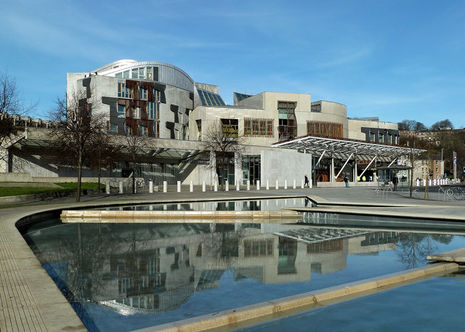Scotland’s lockdown reminds us of the constitutional crisis we still face
Oliver Rhodes argues that the devolved responses to the pandemic are exposing awkward fault lines in our ‘Disunited Kingdom.’

‘Put Army on Scotland-England border to stop lockdown trips’. I read this suggestion in The Scotsman last week. It came days after the Scottish, Welsh and Northern Irish administrations decided to stagger their plans to lift the lockdown behind England.
It mattered little who came up with the rather obtuse idea (a local councillor from Argyll and Bute) nor how likely this outcome was (it doesn’t seem very). What mattered was the headline’s potential to trigger an emotional reaction in its readers – and it did, at least in me.
Why? The fate of the Anglo-Scottish border has been high on the emotional register of Scottish debate for the past six years. The proposal for a military frontier, however bombastic, is only the most click-bait example of how the pandemic has collided with the emotive politics of devolution, and permanently altered it.
"Up here, the message about lockdown seems unequivocal: Johnson speaks for England only. Sturgeon speaks for Scotland."
The pandemic has become entangled in partisan loyalties. A few days after the Scotsman’s article, Sarah Smith, the Scotland Editor for BBC News, got into trouble for suggesting that First Minister Nicola Sturgeon was ‘enjoying’ the opportunity that devolved powers had offered her to part ways with political opponents at Westminster. The devolved response, like that other thing we were talking about only a few months ago, has exposed a constitutional mess: how are we to take Sturgeon’s call to ‘ignore’ the advice of the Prime Minister? Do the daily press briefings at Downing Street now apply only to English residents? By whose laws have the police been empowered on both sides of the border to enforce separate lockdown policies? Up here, the message about lockdown seems unequivocal: Johnson speaks for England only. Sturgeon speaks for Scotland.
Like a good sci-fi novel, it is how the humans have reacted to disaster that is the real story. Fingers are being pointed: to government austerity; to the lethargy of international organisations; to the Chinese government. Yet when the historical perspective on coronavirus is written, it may well be a story of continuity rather than change – the final nail for the high-street; the Johnson government’s tentative retreat from austerity mutated into the language of Big Society. Is the prospect of a patrolled border at Berwick-Upon-Tweed not an extension of a drift that’s already been slowly occurring in British politics? By making an effective border a necessary public health measure and, in theory, enforceable by law and the police, has the pandemic permitted us to reach the imaginative threshold for Scottish independence?
"I am not alone in failing to take devolved politics seriously: it has always seemed to be a parochial side-show for the main act at Westminster."
For a cosmopolitan Scot with strong ties to England, I hope not. What it has done is confirm that devolved governments are no longer just the symbolic reserves of nationalist rhetoric they have been in the past. On a Zoom call with some of my university friends recently I realised that where we are located on this island will fundamentally alter our experience of ‘liberation.’ For the luckier among us it may soon be possible to meet up physically with our friends in a park, maybe somewhere in London (where everyone I know from Cambridge seems to live). The Scottish administration, meanwhile, has been very conservative in its ‘exit strategy’, with all schools to remain shut for the next three months. I am not alone in failing to take devolved politics seriously: it has always seemed to be a parochial side-show for the main act at Westminster. Not anymore. For the purposes of this crisis, I live in a foreign country.
The fragility of my cosmopolitan Cambridge identity has confronted the realities of a ‘federal’ Britain, where loyalty to devolved governments has taken centre stage. Once upon a time, the concept of an overarching ‘British’ government seemed far more secure and internally consistent. That idea, for practical purposes, seems to have vanished: the effective sovereignty of the UK government has been lost amidst the lingo of lockdown – ‘Stay Home’ vs. ‘Stay Alert’ – and the constant updates from all four nations about the current policy on sunning oneself in the park, or going on more than one run a day. As state power has infiltrated the minutiae of our lives, its focal point has become much more localised.
Of the memories I have been salvaging from my Cambridge life, one of the most amusing was the accusation of being a ‘fake Scot’. My preppy east-coast burr and fondness for tweed jumpers made me fair game for this particular label; however it also reflected my awkward efforts to continue my commitment to the idea of ‘Britain’ as a culturally, if not politically, unified whole. The pandemic does not mean the death of Britain. When the post mortem on Britain’s lockdown policy is conducted, however, the devolved leaders will surely take centre stage in the emotional perception, as well as the political responsibility, for handling the crisis. That’s especially true as devolved leaders make increasingly tough calls on when to end lockdown – lives are at risk, but also livelihoods, and people will be angry. In laying bare the mechanics of federalism, the pandemic has also exposed the devolved governments to a greater level of scrutiny than they’ve ever had to endure.
Like many crises in history, the pandemic has thrust the abstract abruptly into the domain of political possibility. A military border at Berwick was always a trope of Unionist discourse, given greater firepower by the prospect of a pro-European Scotland in a post-Brexit future. It has taken the crisis to make that trope a fleeting but tangible possibility. While the fight against coronavirus has been a unifying experience, it has certainly not put thorny emotional and political questions about the future of Britain to the wayside. Quite the opposite: it has forced us to confront those questions directly. In times of crisis, where do our borders, and our loyalties, lie?
 News / Cambridge academics sign open letter criticising research funding changes22 February 2026
News / Cambridge academics sign open letter criticising research funding changes22 February 2026 News / Supporters protest potential vet school closure22 February 2026
News / Supporters protest potential vet school closure22 February 2026 News / University Council rescinds University Centre membership20 February 2026
News / University Council rescinds University Centre membership20 February 2026 News / Hundreds of Cambridge academics demand vote on fate of vet course20 February 2026
News / Hundreds of Cambridge academics demand vote on fate of vet course20 February 2026 News / Union cancels event with Sri Lankan politician after Tamil societies express ‘profound outrage’20 February 2026
News / Union cancels event with Sri Lankan politician after Tamil societies express ‘profound outrage’20 February 2026










